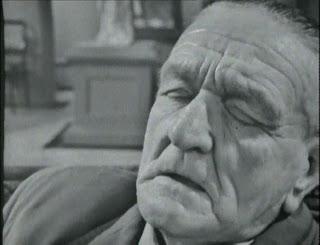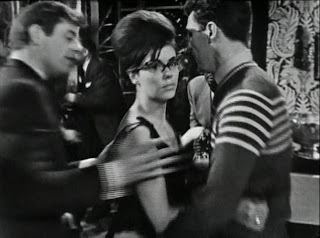Regular readers with longish memories might remember that when Neil Hallett first appeared as Ghost Squad operative Tony Miller he was accompanied by another agent, Sally Lomax (Patricia Mort) - though she hasn't been seen since. Well this week, in the absence of Miller and Nick Craig, Sally gets to star in her very own adventure. It's called
The Thirteenth Girl, and it's a corker - involving, as it does, au pair girls sold into good old fashioned white slavery.
When we first see Sally, she's practising her judo throws, clearly in the hope of becoming the new Cathy Gale. It's a shame
Honor Blackman's Book of Self-Defence hadn't been published yet, as having Sally read that would have been a masterstroke.
Sally's ambitions are swiftly punctured by grumpy old Superintendent Stock, who suggests she'd be better off as a belly dancer and dispatches her to make the tea when guest star John Carson arrives as Swiss detective Franz Hartmann.
Hartmann's come to enlist the squad's aid in solving the murders of two Swiss au pairs who were working in London - one of whom was his own fiancee. It soon emerges that in fact 11 au pairs from a variety of countries have gone missing. And they've all been employed by the same agency, run by the seemingly charming Connie Amhurst (Peggy Marshall). Sally's assigned to get a job from Connie's agency, in the guise of a be-pigtailed Swiss girl. She gets to act like a proper spy, with a camera concealed in a (huge) pendant and everything.
Sally's swiftly placed with finicky widow Mrs Henderson (future Hazel the McWitch Molly Weir), who casts a critical eye over her domestic activity despite later being revealed as an old friend of Stock's who knew who Sally was all along. Here you get a glimpse of the charming floral ensemble Sally wears to do her hoovering.
Connie Amhurst appears to have the best of motherly intentions toward Sally, encouraging her to visit the International Friends Club rather than the town's less salubrious nightspots. On her visit there Sally just about manages to escape the attentions of the club's manager, ageing would-be lothario "Whitey" Whitehead (John Wentworth).

Hartmann, meanwhile, finds out that Connie's not as sweet as she seems: she's got a string of vice convictions almost as long as her list of aliases. She and Whitey (her husband, as it turns out), entrap girls by getting them drunk at parties and making them think they've killed Whitey while fending off his advances. Connie then offers her assistance in helping them escape to Birmingham... where a terrible fate awaits them (I shall refrain from jokes about a terrible fate awaiting anyone who escapes to Birmingham). Their latest victim's naive Dane Bodil Anderson (familiar 60s glamour girl Edina Ronay). The honey in the trap's provided by Connie's associate Ray (John Ronane), who somehow manages to make all of the target girls fall in love with him (never underestimate the power of a good overcoat).
Sally boards the train with Bodil, and after they nearly both fall victim to Whitey and his thugs she gets the chance to show the baddies what she's made of.
One of the great pleasures of 1960s film and TV is the ubiquitous party scene - and in particular the extras to be seen shaking their stuff in the background. There are some amazing characters to be seen at Bodil's 21st birthday party, twisting the night away for all they're worth. Although this moustachioed chap looks thoroughly uncomfortable, and may have taken a wrong turning on the way to the Conservative club.
My particular favourite is the glamorous bespectacled lady here...
...later to be seen slow dancing with a chap in a fantastic jumper.
As we're in a community of international visitors, there's a much wider mix of ethnicities than you'd normally see on TV at this time. Rather daringly, the man Sally slow dances with is black (although he's not built up into a proper character).
Cult TV fans may like to note that after last week's guest appearance from John Paul,
The Thirteenth Girl features his eventual
Doomwatch co-star Simon Oates as an amorous client of Connie's.
The Thirteenth Girl is smashing fun, superbly directed by Peter Sasdy, and packed with fascinating 60s background detail. Patricia Mort's hugely likeable as Sally, a character who stays just about the right side of ditsy.
It's the last in the current series of Arthur's show, and there's a definite air of end-of-term mischief to the episode. Things are turned on their head with the weekly tramp sketch starting rather than closing the show. Dermot's in agony with a toothache, and as he waits for the dentist Arthur does his best to make things worse by using his trusty denture nutcrackers and relating gruesome dental scare stories - and managing to sneak in an unexpected salute as he describes a great big pair of pinchers.
Arthur's offer to try and extract Dermot's troublesome tooth with his utility dentures, and his demonstration of how he sharpens them to shave with, are sinister to say the least.
On entering dentist Nicholas Parsons' office and discovering nearly all his teeth need to be extracted, Dermot tries to escape: "I'm not entitled to the benefits, I'm a foreigner," he claims. "Then you're more entitled than an Englishman," Parsons drily responds, to wild audience applause. Some things never change.
It's an unusually ribald sketch, sailing especially close to the wind with a couple of double entendres: "You've no right to come in here and leave your nuts lying around," Parsons exclaims, angered by Arthur bringing some nibbles in with him. Later the dentist produces a huge hypodermic needle. "He's gonna stick it up your gum," Arthur warns his friend. "He's not sticking it up my gum, I couldn't stand the pain!" cries Dermot.
The sketch ends in characteristically dark fashion with a gas accident rendering Parsons unconscious and Arthur and Dermot deciding to make off with his gold teeth.
This week's musical spot sees the return of the series' liveliest guests, the late Kenny Ball and His Jazzmen. I like drummer Ron Bowden's personalised kit... and is that George Baker on trombone?
"Now we'd like to give you the opportunity to go out and put the kettle on, 'cos I'm gonna sing," Kenny banters endearingly between numbers, giving us a sweet rendition of "My Mother's Eyes".
The series ends in admirably chaotic fashion with Arthur, Dermot and Parsons on stage performing Shakespeare - Arthur's bizarre choice of walk causing Parsons to crack up as per.
But while the leading lady (strangely enough another
Doomwatch regular, Jean Trend) attempts her big speech, the rest of the cast notice a fire's broken out in the corner of the set.
Cue various ludicrous attempts to put out the fire while carrying on with the show, climaxing with Arthur setting himself on fire. Now there's a stunt to finish your series with.
As the credits roll, the cast - joined on stage by Kenny Ball and his band - take a bow.
Arthur Haynes will be back next year. I don't know about you, but I can't wait.
Tonight's instalment of our favourite psychiatric drama is, well, bizarre. To say the least. It all starts off with middle-aged couple Henry and Julia (
The Good Old Days MC Leonard Sachs and Ursula Howells, star of one of my favourite films,
Mumsy, Nanny, Sonny and Girly) attending a party. On spotting a Dorsesque blonde, Julia flies into a fit of rage, convinced she's having an affair with Henry. Removed from the party by her concerned friends, Julia slashes her wrists with shards of glass from a broken vase.
Julia survives, and is taken to Dr Corder's hospital, where she tells Henry she'll give him a divorce, and refuses to see him ever again.
However, Henry insists to Corder and Jimmy Davis that there's never been another woman, and that he's unable to understand Julia's insane jealousy. It looks to our psychiatrist heroes like a pretty simple case: Julia, who hates herself for being unable to have a child, has convinced herself that the perfectly innocent Henry's found himself a woman the opposite of her. But then Henry's boss Norman (Patrick Whyte) shatters this theory by revealing that Henry's excuse for returning home late - dinners with clients - is a bare-faced lie.
So what
is Henry up to? This is where the episode springs its mid-point twist: he's even more screwed up than his wife. Norman and Corder follow him from work and watch as he stands on a railway bridge by the Horlicks building taking part in a montage sequence, and when he lifts a small boy up to see the trains there's a heart-stopping moment where it looks like he's about to throw the child on to the tracks.
Corder and Norman follow Henry to the railway station, where he eludes them by the simple expedient of putting on a jumper and combing his hair forward.
Is Henry a schizophrene, wonders Jimmy, warning Dr Corder, "As you've said yourself many times, schizophrenes can be dangerous."
When Henry disappears, Corder's daughter Jennifer - as is often the case - supplies a vital clue: she's seen Henry before at a swinging nightclub that glories in the name of The Cat's Picnic. Corder sends his assistant Jane to investigate. And what she sees is not easy for her (or us) to credit: Leonard Sachs doing the twist in a pair of leather trousers!
It turns out that Henry, whose adolescence was curtailed by his strict father's insistence on him spending his whole time studying, has been desperately trying to experience the youth he missed out on. To this end, he regularly takes himself off to The Cat's Picnic to ingratiate himself with hip young things - though the moody lot only look on the try-hard old geezer with contempt.
 |
| The handsome chap at the back's Robin Hawdon, star of lunatic sci-fi sexploitation movie Zeta One |
Henry's attempts to get down with the kids are so pathetic they're difficult to watch. He ends up trying to prove himself by racing a motorbike (he makes the mistake of referring to it as a "sickle" - to him this is hip jargon, to the kids it's hopelessly passé), only to get knocked out by its rightful owner.
Luckily Jane steps in to plead that the kids stop being so beastly, and they're shamed into feeling pity for poor old Henry.
Dr Corder's slightly worrying solution to Henry and Julia's problems is for them to adopt a child (I'm not sure that'd be the best household to grow up in). Not that he thinks Henry wanting to behave like a youngster's such a bad thing - he even encourages him to buy his own motorbike (that timeless symbol of the mid-life crisis). Time's had a funny effect on
The Lost Hours, with much of it now looking absolutely ridiculous (although utterly fascinating for 60s enthusiasts) - however, beyond its hokey representation of youth culture and its interesting trousers there's a deeply affecting drama, superbly acted by Sachs and Howells.
The Lost Hours is stuffed with more delightful background details than just about any other programme I've featured at
TV Minus 50. Here are two that I especially love. The name of the company Henry works for:
 |
| I wonder what they do? |
And the (presumably genuine) poster centre screen here. Now THAT's what I call advertising.















































































